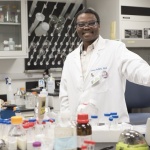
News • Fighting cancer
Light-triggered nanoparticles show promise against metastatic cancer
Tumor imaging technique has potential as anti-cancer weapon, mouse study shows.

Tumor imaging technique has potential as anti-cancer weapon, mouse study shows.
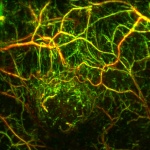
For centuries, hands, eyes and ears were the physicians’ most important instruments when it came to detecting and diagnosing disease. Today, one of the traditional techniques, percussion, is being revived, supported by state-of-the-art technology and dressed in a new name: optoacoustics. In one of the most exciting visionary ideas in modern healthcare short laser pulses (optics) are transmitted…
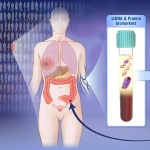
Johns Hopkins Kimmel Cancer Center researchers developed a single blood test that screens for eight common cancer types and helps identify the location of the cancer. The test, called CancerSEEK, is a unique noninvasive, multianalyte test that simultaneously evaluates levels of eight cancer proteins and the presence of cancer gene mutations from circulating DNA in the blood. The test is aimed at…
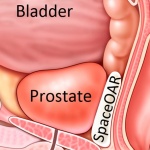
Radiation therapy is a popular and effective treatment for many men with prostate cancer, and now a temporary gel offers greater protection for organs at risk during treatments. “Treating prostate cancer with radiation therapy can cause unintended injury to adjacent, healthy tissue, which can lead to bowel and urinary problems, as well as erectile dysfunction,” said Daniel Krauss, M.D., a…
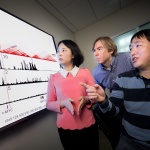
Researchers have identified mechanisms that drive about 10 percent of high-risk neuroblastoma cases and have used a new approach to show how the cancer genome “hijacks” DNA that regulates other genes. The resulting insights may help scientists develop more effective therapies, including precision medicines. The research involved investigators at St. Jude Children’s Research Hospital;…

A new Michigan State University study is helping to answer a pressing question among scientists of just how close mice are to people when it comes to researching cancer. The findings, now published in PLOS Genetics, reveal how mice can actually mimic human breast cancer tissue and its genes, even more so than previously thought, as well as other cancers including lung, oral and esophagus.…
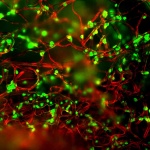
T cells play a key role in the body’s immune response against pathogens. As a new class of therapeutic approaches, T cells are being harnessed to fight cancer, promising more precise, longer-lasting mitigation than traditional, chemical-based approaches. These “living drugs” are poised to transform medicine, with a growing number of cellular therapies receiving FDA-approval. A current…
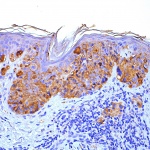
Researchers in the Perelman School of Medicine at the University of Pennsylvania have identified a new therapeutic target for the treatment of melanoma. For decades, research has associated female sex and a history of previous pregnancy with better outcomes after a melanoma diagnosis. Now, a research team from Perelman School of Medicine at the University of Pennsylvania says it may have…
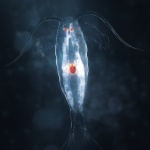
A team of scientists at the Keck School of Medicine of USC is looking to some deep sea dwellers to create a better way to develop cancer-fighting therapies. Harnessing the power of the enzymes that give these marine animals the ability to glow, the team created a test that makes it easy for researchers to see whether a therapy is having its intended effect — killing cancer cells. The results of…
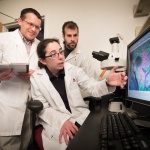
St. Jude Children’s Research Hospital oncologists have discovered the cell type that gives rise to rhabdomyosarcoma, the most prevalent soft tissue cancer in children. Previously, scientists thought the cancer arose from immature muscle cells, because the tumor resembled muscle under the microscope. However, the St. Jude researchers discovered the cancer arises from immature progenitors that…
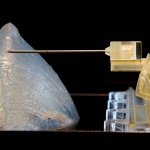
Cancer surgeons perform an estimated 1.7 breast biopsies each year, according to the American Association of Preferred Provider Organizations. This makes the procedure a significant proportion of cases referred to anatomic pathologists. This surgery, however, is time-consuming and not always accurate due to shortcomings in existing surgical technology and to human error. Now, a 3D-printed…
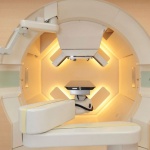
Hitachi, Ltd. announced that it has entered into an agreement to provide Clinica Universidad de Navarra (CUN) with its proton beam therapy (PBT) system. The agreement includes PBT system maintenance following completion of the systems' installation. The PBT System will be installed at CUN's facility in Madrid, Spain and is equipped with state of the art technology including spot scanning…
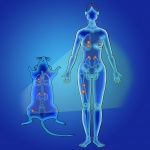
Using light-emitting nanoparticles, Rutgers University-New Brunswick scientists have invented a highly effective method to detect tiny tumors and track their spread, potentially leading to earlier cancer detection and more precise treatment. The technology could improve patient cure rates and survival times. “We’ve always had this dream that we can track the progression of cancer in real…
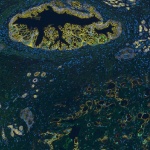
Genentech researchers have identified an enzyme that shifts pancreatic cancer cells to a more aggressive, drug-resistant state by epigenetically modifying the cells’ chromatin. The study, which will be published in the Journal of Cell Biology, suggests that targeting this enzyme could make pancreatic cancer cells more vulnerable to existing therapies that currently have only limited effect…
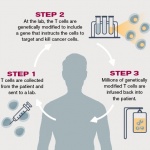
Loyola University Medical Center is the only Chicago center that participated in the pivotal clinical trial of a groundbreaking cancer treatment that genetically engineers a patient's immune system to attack cancer cells. Patrick Stiff, MD, director of Loyola's Cardinal Bernardin Cancer Center, is a co-author of the study, published in the New England Journal of Medicine. The treatment used in…
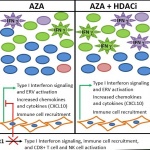
Johns Hopkins Kimmel Cancer Center researchers demonstrated that mice with ovarian cancer that received drugs to reactivate dormant genes along with other drugs that activate the immune system had a greater reduction of tumor burden and significantly longer survival than those that received any of the drugs alone. The study already spurred a clinical trial in ovarian cancer patients. The…
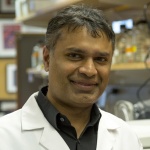
Cancer therapies including radiation and chemotherapy seek to treat the disease by killing tumor cells. Now a team including researchers at Beth Israel Deaconess Medical Center (BIDMC) have shown that the dead and dying cancer cells generated by chemotherapy and targeted cancer therapy paradoxically trigger inflammation that promotes aggressive tumor growth. In a study published today in the…
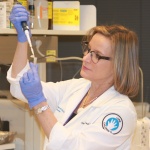
Findings published in Oncotarget offer new hope for children with highly aggressive brain tumors like atypical teratoid/rhabdoid tumor (AT/RT) and medulloblastoma. Previously, the authors of the study have shown that an experimental drug that inhibits polo-like kinase 4 (PLK4) stopped pediatric brain tumor growth in vitro. Now, they have demonstrated its success in an animal model – the drug…
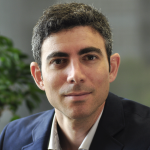
Nitzan Rosenfeld from Cancer Research UK in Cambridge is being honored with the 2017 Meyenburg Award, which carries a €50,000 monetary prize. He receives the award for his excellent work on the detection of tumor DNA in the blood. Rosenfeld has made seminal contributions to advancing a method for detecting cancer DNA in the blood to applicability in cancer medicine. The Meyenburg-Award will be…
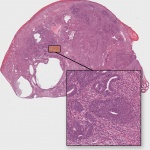
Cornell researchers have taken a major step toward answering a key question in cancer research: Why is testicular cancer so responsive to chemotherapy, even after it metastasizes? Professional cyclist Lance Armstrong, for example, had testicular cancer that spread to his lung and brain, yet he made a full recovery after conventional chemotherapy. The key to such success appears to lie in the…
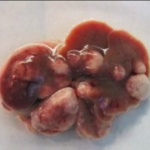
Primary liver cancer is now the second leading cause of cancer-related death worldwide, and its incidences and mortality are increasing rapidly in the United Stated. In late stages of the malignancy, there are no effective treatments or drugs. However, an unexpected finding made by a team of University of California San Diego School of Medicine researchers sheds light on the development of a new…
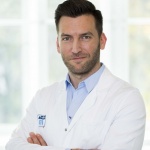
Progressive treatments offer new chances for cancer patients, but also could result in as yet unknown complications. The number of cancer patients transferred to the ICU for cancer-specific and internal medicine related reasons is on the increase. Caring for them on the ICU is a complex challenge, with interdisciplinary cooperation playing an essential part. Certain criteria need to be met for…
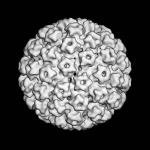
A novel vaccine against cancer-causing human papillomaviruses (HPV) is intended to help raise vaccination rates especially in developing countries. To this end, scientists from the German Cancer Research Center (DKFZ) in Heidelberg are developing a completely new vaccination concept based on a low-cost vaccine that protects from almost all known oncogenic HPV types. The project has now been…
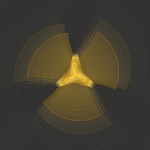
A new EC-funded project will bring together medical and radiation scientists, physicists and clinicians to enhance the radiation protection of patients and medical professionals. The four-year MEDIRAD project, which kicked off in June 2017, is led by the European Institute for Biomedical Imaging Research – EIBIR (AT) and comprises a consortium of 33 partners from 14 European countries.
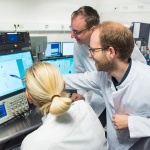
Many tumors possess mechanisms to avoid destruction by the immune system. For instance, they misuse the natural “brakes” in the immune defense mechanism, which normally prevent an excessive immune response. Researchers at the University of Bonn have now been able to take off one of these brakes. The study, which involved colleagues from Hamburg and Würzburg, could pave the way for more…